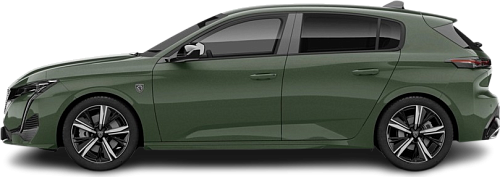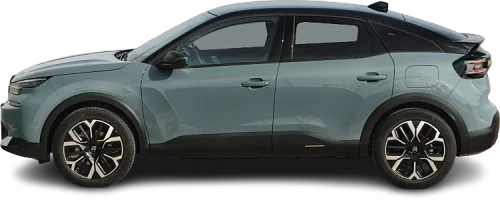USA EV Comparison: Peugeot e-308 Hatchback vs Citroën e-C4 50 kWh
Struggling to Decide? Let AI Help!
Your AI Summary Is Ready!
General Info
While both vehicles are currently in production, they are not sold in the United States.
The two vehicles share the same body style: Hatchback.
| Property | Peugeot e-308 Hatchback | Citroën e-C4 50 kWh |
|---|---|---|
| Years of Production | 2023-… | 2024-… |
| Current Status | Produced | Produced |
| Country of Manufacture | France | Spain |
| Body Style | Hatchback | Hatchback |
| Market Availability | EU | EU |
| GCC Score | 5.3 | 5 |
Range and Efficiency
The Peugeot e-308 Hatchback (2023-…) boasts a greater real-world range, a larger battery, and superior energy efficiency compared to the Citroën e-C4 50 kWh (2024-…).
| Property | Peugeot e-308 Hatchback | Citroën e-C4 50 kWh |
|---|---|---|
| Range (WLTP) | 255 mi | 220 mi |
| Range (GCC) | 217 mi | 189 mi |
| Battery Capacity (Nominal) | 54 kWh | 50 kWh |
| Battery Capacity (Usable) | 50.8 kWh | 46.3 kWh |
| Efficiency per 100 mi | 23.4 kWh/100 mi | 24.5 kWh/100 mi |
| Efficiency per kWh | 4.27 mi/kWh | 4.08 mi/kWh |
| Range and Efficiency Score | 7.2 | 6.5 |
Charging
Both vehicles utilize a standard 400-volt architecture.
Both vehicles support DC fast charging with a maximum power of 100 kW.
The Peugeot e-308 Hatchback (2023-…) features a more powerful on-board charger, supporting a maximum AC charging power of 11 kW, whereas the Citroën e-C4 50 kWh (2024-…) is limited to 7.4 kW.
| Property | Peugeot e-308 Hatchback | Citroën e-C4 50 kWh |
|---|---|---|
| Max Charging Power (AC) | 11 kW | 7.4 kW |
| Max Charging Power (DC) | 100 kW | 100 kW |
| Architecture | 400 V | 400 V |
| Charge Port | CCS Type 2 | CCS Type 2 |
| Charging Score | 5.4 | 4.3 |
Performance
Both vehicles are front-wheel drive.
The Peugeot e-308 Hatchback (2023-…) boasts greater motor power and accelerates faster from 0 to 60 mph.
| Property | Peugeot e-308 Hatchback | Citroën e-C4 50 kWh |
|---|---|---|
| Drive Type | FWD | FWD |
| Motor Type | PMSM | PMSM |
| Motor Power (kW) | 115 kW | 100 kW |
| Motor Power (hp) | 154 hp | 134 hp |
| Motor Torque | 192 lb-ft | 192 lb-ft |
| 0-60 mph | 9.4 s | 10.4 s |
| Top Speed | 106 mph | 93 mph |
| Performance Score | 3 | 2.6 |
Dimensions
The Citroën e-C4 50 kWh (2024-…) is taller, but has a similar length and width to the Peugeot e-308 Hatchback (2023-…).
Both models have similar wheelbase lengths.
| Property | Peugeot e-308 Hatchback | Citroën e-C4 50 kWh |
|---|---|---|
| Length | 171.9 in | 171.7 in |
| Width (with Mirrors) | 81.2 in | 80 in |
| Width (w/o Mirrors) | 72.9 in | 72.2 in |
| Height | 56.7 in | 60 in |
| Wheelbase | 105.3 in | 105.1 in |
Cargo and Towing
The Peugeot e-308 Hatchback (2023-…) provides more cargo capacity, featuring both a larger trunk and more space with the rear seats folded.
Neither car is equipped with a frunk (front trunk).
Neither vehicle is officially rated for towing in the US.
| Property | Peugeot e-308 Hatchback | Citroën e-C4 50 kWh |
|---|---|---|
| Number of Seats | 5 | 5 |
| Curb Weight | 3878 lb | 3386 lb |
| Cargo Volume (Trunk) | 14.5 ft3 | 13.4 ft3 |
| Cargo Volume (Max) | 46.7 ft3 | 44.1 ft3 |
| Cargo Volume (Frunk) | - Cargo Volume (Frunk) | - Cargo Volume (Frunk) |
| Towing Capacity | - Towing Capacity | - Towing Capacity |
| Cargo and Towing Score | 3.9 | 4.3 |




